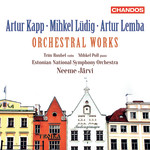
Kapp / Lemba / Ludig: Orchestral Works
 $40.00
Low Stock
add to cart
$40.00
Low Stock
add to cart
ARTUE KAPP / ARTUR LEMBA / MIKEL LUDIG
Kapp / Lemba / Ludig: Orchestral Works
Estonian National Symphony Orchestra, Neeme Järvi
[ Chandos / CD ]
Release Date: Friday 7 February 2020
Should this item be out of stock at the time of your order, we would expect to be able to supply it to you within 2 - 5 business days.
In his latest recording for Chandos with the Estonian National Symphony Orchestra, Neeme Järvi explores pieces by three of Estonia's first composers. The bulk of the works in the programme were composed in the first decade of the twentieth century, and are all excellent representations of the birth of Estonian Music, as Estonia transitioned from a territory in the Russian Empire to an independent nation state. As was the norm at the end of the nineteenth century, these composers studied at the St Petersburg Conservatory, and Estonian symphonic music certainly has its roots in the Russian nationalist style. Like so much of European music of this era, ethnic identity is emphasised by the inclusion of native folk tunes, and the 'Nordic' style of Grieg and others is clearly an influence.
Kapp's Fourth Symphony, however, was written after WWII, when Estonia and the other Baltic states were occupied by the Soviet Union, and is dedicated to the thirtieth anniversary of the All-Union Leninist Young Communist League (although probably not by choice), one reason for the title 'Youth Symphony'. Kapp also subtitled it 'Classical Symphony' and its compact form and light textures deliver a distillation of the Estonian style.
"Anyone a little hesitant about straying outside the well-known should not be concerned with this release: it invites exploration." MusicWeb
Tracks:
MIHKEL LÜDIG
Overture-Fantasy No.2 (1945)
ARTUR LEMBA
Concerto No.1 (1905, revised 1910) *
MIHKEL LÜDIG
Midsummer Night (1910)
Overture-Fantasy No.1 (1906)
ARTUR KAPP
The Last Confession (1905)
Symphony No.4 'Youth Symphony' (1948)
